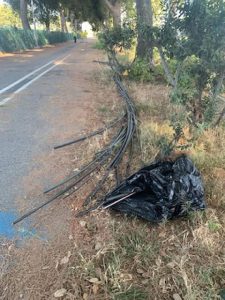
By Willy Okonji-
“This Is a Dark Day for Free Speech in Nigeria,” Activists Say
Olamide Thomas, a vocal #EndSARS activist, is at the center of a heated national debate after being charged with criminal offenses for remarks made about Seyi Tinubu, son of President Bola Ahmed Tinubu, during a police brutality protest in Abuja.
Thomas, known for her advocacy against police misconduct, was accused of violating the Cybercrimes Act by allegedly making statements aimed at bullying and harassing Tinubu.
The charges stem from a viral video recorded during the protest, where Thomas, visibly distressed after being tear-gassed, criticized the younger Tinubu and the police.
“I was speaking out against injustice,” Thomas reportedly told the court during her arraignment. “The tear gas was still stinging my eyes when I recorded that video. Is this how they silence our pain?”
Thomas has since been remanded in custody, a move that could see her spend the holiday season behind bars as courts prepare for their Yuletide recess.
The decision has sparked outrage across Nigeria, with hashtags like #FreeOlamideNow trending on social media.
Many citizens view the case as an attempt by the Tinubu administration to suppress dissenting voices. “This is nothing but an assault on freedom of expression,” said human rights lawyer and activist Ayo Olatunji.
“Olamide is being punished for speaking truth to power. It’s ironic because this administration came into office promising to protect democratic rights.”
Criticism has also been leveled at the judicial process. “When cases involving ordinary Nigerians drag on for years, but a protester is swiftly arraigned for criticizing the president’s son, it raises serious questions about judicial independence,” noted political commentator Funke Adebanjo.
Adding to the tension is the ongoing legal battle faced by another activist, Dele Farotimi, further fueling fears of a systematic crackdown on dissent. Many Nigerians are drawing parallels between these events and previous administrations, accusing the government of hypocrisy.
“We fought against tyranny during #EndSARS, and now we’re back in the same place,” said a protester who asked to remain anonymous. Civil society groups and international watchdogs have called on the government to reconsider its approach to handling dissent.
“Silencing critics will not solve Nigeria’s challenges. It will only deepen mistrust,” said Amnesty International in a statement.
As Thomas awaits her next court date, the nation remains divided on the implications of her arrest, with the debate highlighting deeper concerns about human rights, free speech, and the state of democracy in Nigeria.




